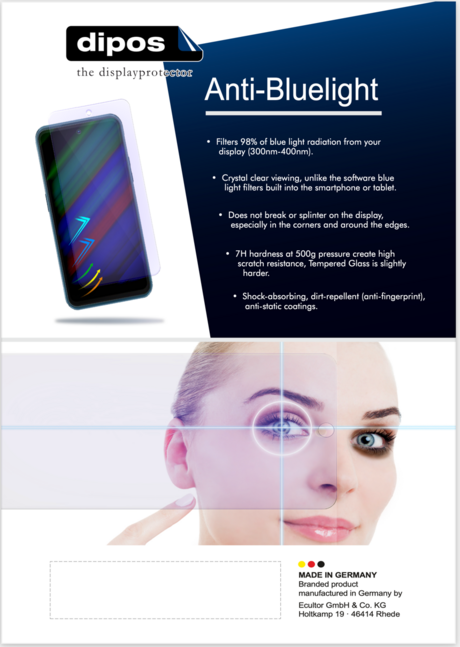What damage is caused by blue light, especially for children?
Because children's eyes are still developing, blue light is able to penetrate the retina much more efficiently and directly (i.e. more aggressively).
Dr. Kokkinakis, a researcher in this field, is afraid that unfortunately we will only come to the realization of the serious problem for children's eyes; through the use of mobile phones etc. in a few years.
Tablets and smartphones are already being put into the hands of 2-3 year old children without parents knowing enough about the serious consequences this can have for the health of their children.
Parents would like to create small free spaces for themselves and satisfy the child when going out to eat, shopping and doctor's appointments by giving the small handy "all-rounders" like tablets and smartphones to their children.
As much as the blue wavelengths are of decisive positive importance in daylight because they positively stimulate our attention, reactivity and mood, the artificial blue light of digital devices in the evening or at night has just as catastrophic an effect because it disturbs the circadian rhythm/sleep-wake rhythm already mentioned above.
The closer we hold the devices in front of our eyes to stare intensively at the displays, the less the eye blinks, the more intense the exposure and the higher the risk of possible damage to the eye.
This happens because we open our eyes much wider than when reading a book, for example.
This leads to tense, aching, dry eyes and consequently to headaches.
This also affects many young people, because in the evening, when peace and quiet finally returns, they reach for their tablet or smartphone in bed to "text" friends or send selfies.
The tiredness that has just pressed you into the pillow is lost when reading, wiping and typing.
The blue wavelength of the light that tablets, smartphones and laptops illuminate makes us feel lively.
We don't even notice the blue coloration, but the screen light is perceived as whitish.
This light has the effect of a caffeine effect. The sleep hormone melatonin, the "pointer" of every person's inner clock, is secreted by the pineal gland in the brain in the dark. However, brightness prevents this.
Blue light signals here immediately: Stay awake!!!
Television is regarded as less problematic due to the distance of use.
To ensure good eye health in children, the following things should be considered:
- Use blue light foil for smartphones and tablets
- Let children play a lot of outdoor games to use positive blue daylight and train the distant vision of the eye; more and more myopia (myony) is caused by staring at monitors
- Limit monitor usage (max.1 hours/day)
- Educating children about eye blinking and screen pauses
- Annual eye checks until the age of 18
- 20-20-20 Follow the rule (get up every 20 minutes, look in the distance for 20 seconds and blink your eye 20 times)

